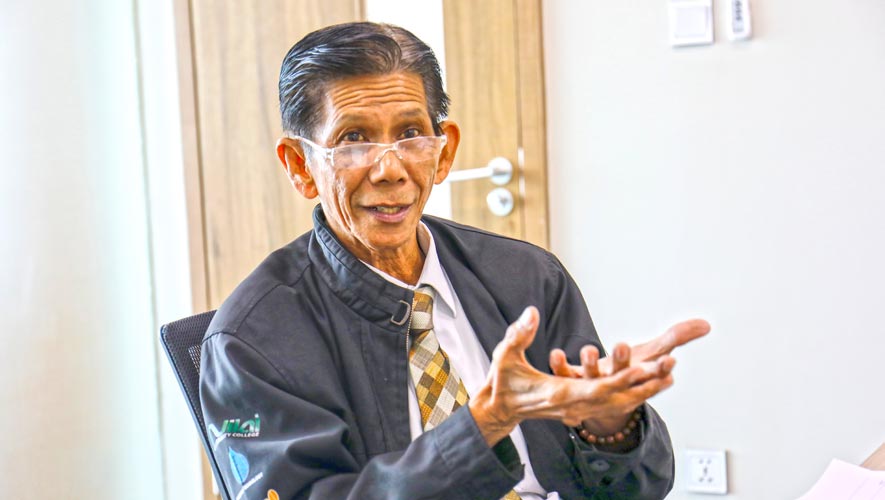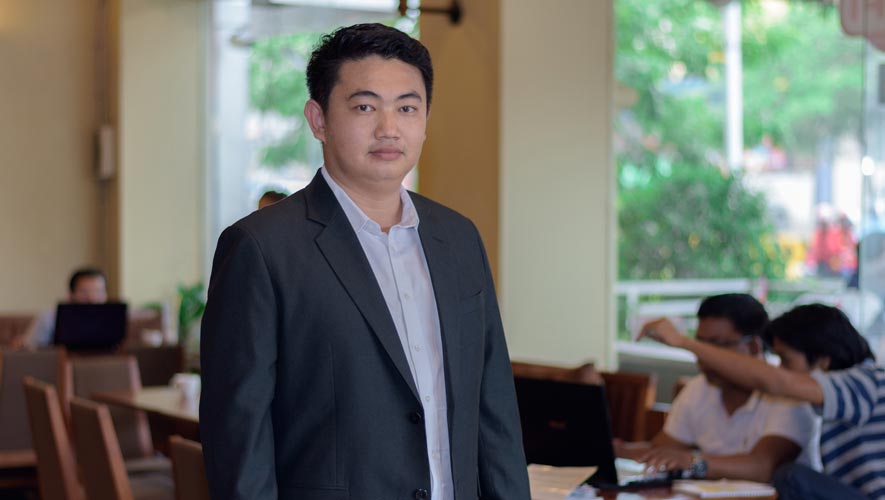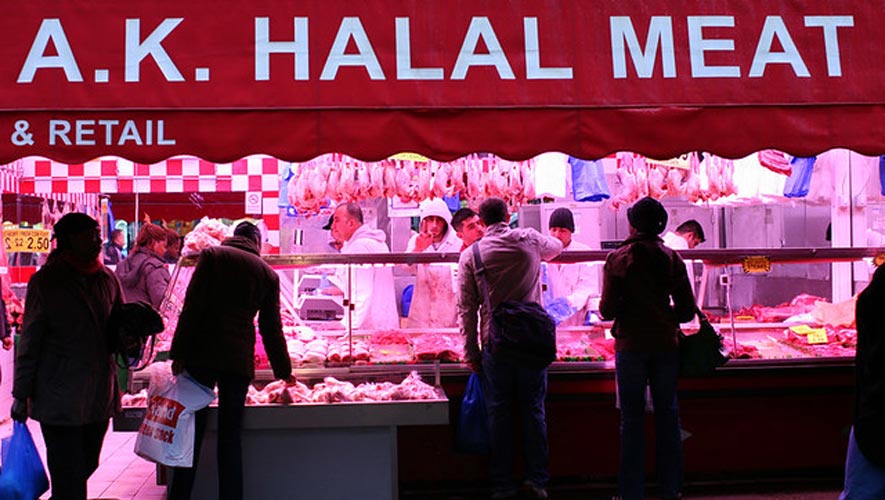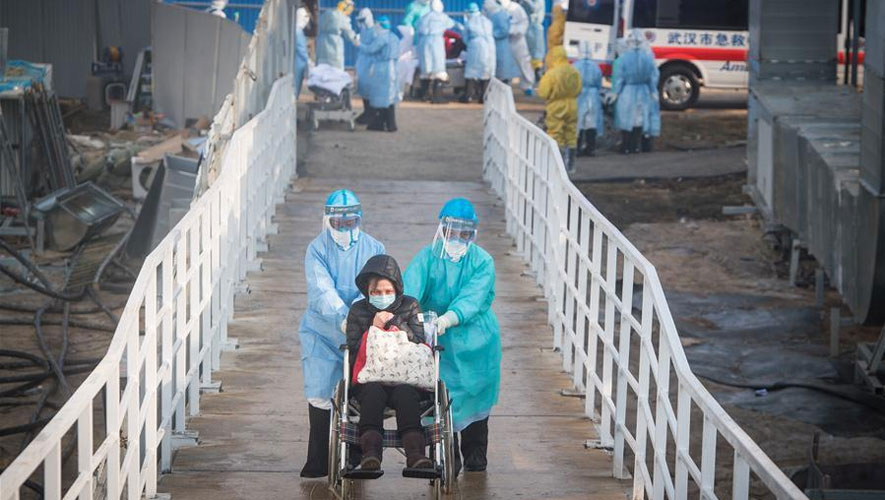Cambodia is slowly developing a halal market in a move that saw the sowing of a surge that began in 2018.
For the latest Cambodian Business news, visit Khmer Times Business
The Kingdom’s attempt at penetrating the market now possesses a standardisation certification process for halal food in the country.
The government and the Ministry of Commerce (MOC) are optimistic that the rule would boost the confidence of Muslim visitors and residents alike in the Kingdom.
Certification announcement
Since the certification announcement in March 2018, the MOC has granted halal certifications to 39 local businesses that comply with the halal standards based on Syariah laws.
More than 60 businesses have now applied for certificates, suggesting a dramatic rise in applications in recent months.
Market for food and beverage
Park Cafe managing director Heng Sengly (pix, right), whose Phnom Penh airport branch was certified halal, enables the restaurant to attract both Muslim and non-Muslim customers as direct flights to Muslim-majority countries increase.
“In the future, we will consider pursuing halal recognition for more stores if the number of Muslim community increases significantly in the centre of Phnom Penh as well as in Siem Reap,” Sengly says.
While the government’s efforts are considered commendable by Muslims in penetrating the growing market, the challenges that are present may also prove to be difficult and costly to overcome in order to place the country as a destination competitor in the halal market.
‘Small and quiet’
“It’s still small and quiet,” says Ahmad Anuar referring to the growth of the halal market in the country.
Anuar, a business development director of Wonderful 28, the biggest lifestyle, food and beverage expo held in Diamond Island, Phnom Penh, says the market, while small in size, is certainly growing with the addition of the halal certification initiatives.

“Prior to the halal certification initiative, we were left on our own to figure out places to eat and not many are located in a trusted environment,” Anuar tells Capital Cambodia recently.
However, he does believe that more work needs to be done in order to attract investors and tourists through the country’s halal strategy.
Cleaning and hygiene factor
“The halal factor is more than just the slaughtering part. It involves the cleaning and hygiene factor as well,” says Anuar.
Animals slaughtered by a slice to the jugular are considered halal. Meat such as pork. however, is explicitly prohibited.
Technical factor
While the religious factor in the halal process is well taken care off with guidance from the highest council of the Islamic body in Cambodia, the technical factor is still a concern to many.
Cambodia currently follows the Thai halal guidance in which the Hazard Analysis and Critical Control Point (HACCP) is met.
The HACCP standards ensure authorities in the halal food and beverage industry prevent hazardous situations through proper sanitation steps – and this involves every step in the way such as the production and processing of food.
“Yes, they have presented the halal certificate to companies, but the technical part of food production is yet to be seen because it is more in-depth and scientific,” says Anuar.
He recalls his time in A&W Malaysia, a fast food outlet where the Department of Islamic Development of Malaysia (JAKIM) had explained through a trip to the United States that the French fries served are initially par-fried in pork lard, making them non-halal.
Need for diversity
While there are increasing numbers of halal restaurants in Phnom Penh, with the likes of Wau Restaurant in Preah Trasak Paem Street and The Gulai Restaurant in Street 144 that attract big groups of tourists from countries such as Indonesia and Malaysia, there is also a need for diversity in the halal restaurant sector in order to cater to the palates of visitors from the Middle East.
Restaurateurs planning to transition to a halal outlet may find it to be financially challenging.
In one instance, Anuar says that restaurateurs would not just have to adapt the slaughtering method but to change the drainage system while the content of construction would have to meet the specialised halal demand in order to prevent contamination – and this in return would cost more money than most might expect.

Potential for import, exports
“If you put halal chicken together with a non-halal chicken, it’s no longer halal. The same applies to beef,” Anuar says, adding that plates used for halal dishes cannot be washed along with other non-halal plates.
Cambodia has worked towards boosting bilateral trade with countries such as Turkey in order to tap in to the potential of exporting halal products to officially secular but Muslim-majority countries.
Prime Minister Hun Sen, who met Turkish President Recep Tayyip Erdogan in the middle of this year, expressed interest in exporting more products to Turkey.
Much potential
This decision was met with support from the Cambodian Chamber of Commerce vice-president Lim Heng, who says that Turkey’s many halal food consumers provide much potential for Cambodia to invest in that type of food production.
The direct flights between both countries are expected to contribute greatly to achieve the goal of increasing trade volumes.
Cambodia received up to 2,339 Turkish visitors in the first three months of this year.
While the government is focusing on exporting end products, Anuar believes that the country would benefit more from exporting raw products that come with halal accreditation.
“With products such as tapioca, corn, rice and other agricultural products, it’s easier to follow the halal regulations as elements concerning the environment and feeding,” Anuar says.
Benefits of more flights
Cambodia’s Ministry of Tourism has been targeting visitors from countries in the Middle East, believing that it has great potential for Cambodia’s tourism market.
According to the ministry, the number of tourists from Muslim countries is expected to increase because of the availability of flight routes connecting the Kingdom to Qatar and the United Arab Emirates.
However, while the increasing number of flights is beneficial to the country’s economy and tourism sector, Anuar believes that in order to take advantage of the flights to benefit the halal market, a wholesome halal package has to be offered.
The Emirates recently launched its new daily service offering flights between Phnom Penh and Dubai while direct flights between Indonesia and Cambodia have resumed with Jakarta-based Citilink Indonesia, this year.
Data from the Malaysian Embassy shows that Muslim visitors from Malaysia make up around seven percent of the total number of visitors.
Data from the Ministry of Tourism states that there has been an increase of 11.8 percent of tourist from Indonesia, up to 55,753 in 2018 from 49,878 in 2017. Tourists from Pakistan saw a 76.7 percent increase from 2017 to 2018.
Infrastructure required
“Infrastructures such as mosques and halal hotels have to be considered as well,” Anuar says, explaining that because the Muslim religion is separated into four different sects, having mosques that caters to all sects would make it easier for Muslims from different countries to visit Cambodia.
And, as for hotels, halal hotels will have to allow Muslims to conduct their prayers five times a day.
According to Katoeu Mohammad Nossry, the Undersecretary of State of Ministry of Tourism, who is in charge of Muslim tourism and halal food, the ministry has created a working group with the objective to work on strategies, planning, studying and promotions in order to attract Muslim tourists.
Nossry goes on to say that the government’s policy has always been to welcome all tourists to visit Cambodia and investors to invest in the country.
In the field of halal tourism, the ministry is working hard towards promoting Cambodia to Muslim investors and tourists from majority-Muslim countries while addressing the lack of facilities such as halal hotels and restaurants.




